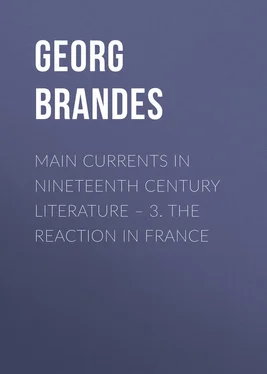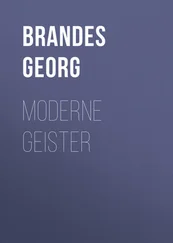Georg Brandes - Main Currents in Nineteenth Century Literature – 3. The Reaction in France
Здесь есть возможность читать онлайн «Georg Brandes - Main Currents in Nineteenth Century Literature – 3. The Reaction in France» — ознакомительный отрывок электронной книги совершенно бесплатно, а после прочтения отрывка купить полную версию. В некоторых случаях можно слушать аудио, скачать через торрент в формате fb2 и присутствует краткое содержание. Жанр: foreign_antique, foreign_prose, на английском языке. Описание произведения, (предисловие) а так же отзывы посетителей доступны на портале библиотеки ЛибКат.
- Название:Main Currents in Nineteenth Century Literature – 3. The Reaction in France
- Автор:
- Жанр:
- Год:неизвестен
- ISBN:нет данных
- Рейтинг книги:4 / 5. Голосов: 1
-
Избранное:Добавить в избранное
- Отзывы:
-
Ваша оценка:
- 80
- 1
- 2
- 3
- 4
- 5
Main Currents in Nineteenth Century Literature – 3. The Reaction in France: краткое содержание, описание и аннотация
Предлагаем к чтению аннотацию, описание, краткое содержание или предисловие (зависит от того, что написал сам автор книги «Main Currents in Nineteenth Century Literature – 3. The Reaction in France»). Если вы не нашли необходимую информацию о книге — напишите в комментариях, мы постараемся отыскать её.
Main Currents in Nineteenth Century Literature – 3. The Reaction in France — читать онлайн ознакомительный отрывок
Ниже представлен текст книги, разбитый по страницам. Система сохранения места последней прочитанной страницы, позволяет с удобством читать онлайн бесплатно книгу «Main Currents in Nineteenth Century Literature – 3. The Reaction in France», без необходимости каждый раз заново искать на чём Вы остановились. Поставьте закладку, и сможете в любой момент перейти на страницу, на которой закончили чтение.
Интервал:
Закладка:
Slowly and laboriously Schlegel progresses. His judgment is still so defective that he fancies it impossible to dispense with Alexandrines; in Romeo and Juliet , he retains the five-footed iambics only "as far as possible"; the scene between Romeo and Friar Laurence he renders in Alexandrines, excusing himself with the remark that this metre is less detrimental in speeches garnished with maxims and descriptions than in the dialogue proper of the drama. The result is the loss of Romeo's lyric fervour.
He feels this himself, and with iron industry and determined enthusiasm sets to work again, rejects the Alexandrines, and compels himself, in spite of the verbosity of the German language, to say in ten or eleven syllables what he had said before in twelve or thirteen. For long it appears to him an impossible task to reproduce each line by one line. The translation swells in his hands as it did in Bürger's. Fourteen English lines become nineteen or twenty German. It seems to him that it is impossible to do with less; until at last he gains true insight, and sees, from the very foundation, how Shakespeare raises the edifice of his art. Now he renounces all amplitude and all redundancy that is not in Shakespeare. Each line is rendered by a single line. He curses and bewails the prolixity and inadequacy of German: his language has such different limits, such different turns of expression from the English language; he cannot reproduce Shakespeare's style; what he produces is a stammer, a stutter, without resonance or fire – but he coerces himself, he coerces the language, and produces his translation.
There is no great exaggeration in Scherer's dictum: "Schlegel's Shakespeare takes its place beside the works given to the world by Goethe and Schiller during the period when they worked in fellowship; there is the inevitable distance between reproductive and productive art, but there is the nearness of the perfect to the perfect."
Having acquired complete mastery of the style, Schlegel now began to reap the fruits of his labour. He, the master, opened his hand, and between the years 1797 and 1801 let fall from it into the lap of the German people sixteen of Shakespeare's dramas, which, in spite of occasional tameness or constraint of style, might, in their new form, have been the work of a German poet of Shakespeare's rank.
Let us consider what this really means. It means not much less than that Shakespeare, as well as Schiller and Goethe, saw the light in Germany in the middle of last century. He was born in England in 1564; he was born again, in his German translator, in 1767. Romeo and Juliet was published in London in 1597; it reappeared in Berlin as a new work in 1797.
When Shakespeare thus returned to life in Germany, he acted with full force upon a public which was in several ways more capable of understanding him than his original public, though it was spiritually less akin to him and though they were not the battles of its day which he fought. He now began to feed the millions who did not understand English with his spiritual bread. Not until now did Central and Northern Europe discover him. Not until now did the whole Germanic-Gothic world become his public.
But we have also seen how much went to the production of an apparently unpretending literary work of this high rank. In its rough drafts and manuscripts we may read great part of the intellectual history of a whole generation. Before it could come into existence nothing less was required than that Lessing's criticism and Wieland's and Eschenburg's attempts should prepare the soil, and that a genius like Herder should concentrate in himself all the receptivity and ingenuity of surmise belonging to the German mind, and should, with the imperiousness characteristic of him, oblige young Goethe to become his disciple. But Goethe in his prose Götz only imitated a prose Shakespeare. There had to be born a man with the unique talent of A. W. Schlegel, and he, with his hereditary linguistic and stylistic ability, had to be placed in a position to acquire the greatest technical perfection of the period. Then he had to free himself, by the influence of Schiller's noble conception of art, from the tendency to coarseness which was the result of Bürger's influence, and at the same time to steer clear of Schiller's tendency to pomposity and dislike of wanton joviality, had to gain a complete understanding of Goethe, to enter into possession, as it were, of the language which Goethe had developed, and to attain to an even clearer conviction than his of the essentiality of the harmony of subject and style in Shakespeare. It was necessary, too, that he should be stimulated by the ardour of a kindred talent and assisted by the keen criticism of a woman. Hundreds of sources had to flow into each other, hundreds of circumstances to coincide, of people to make each other's acquaintance, of minds to meet and fertilise each other, before this work, in its modest perfection, could be given to the world; a small thing, the translation of a poet who had been dead for two hundred years, it yet provided the most precious spiritual nourishment for millions, and exercised a deep and lasting influence on German poetry.
IV
TIECK AND JEAN PAUL
An apprehensive disposition, predisposing to hallucinations, congenital melancholy, at times verging on insanity, a clear, sober judgment, ever inclined to uphold the claims of reason, and a very unusual capacity for living in and producing emotional moods – such were the principal characteristics of Ludwig Tieck. He was the most productive author of the Romantic School, and, after its disruption, he wrote a long series of excellent novels, depicting past and present more realistically than Romantic writers were in the habit of doing.
The son of a ropemaker, he was born in Berlin in 1773. Even as a school-boy he was profoundly influenced by classic writers like Goethe, Shakespeare, and Holberg. He early succeeded in imitating both Shakespeare's elfin songs and Ossian's melodious sadness; but during one period of his youth he weakly allowed himself to be exploited by elder men of letters, at whose instigation he produced quantities of carelessly written, unwholesome literature. Though the spirit and tendency of his writings were prescribed for him, his characteristic qualities are, nevertheless, discernible even in these valueless early works. Under the direction of his teacher, Rambach, he wrote, or re-modelled in the spirit of the "enlightenment" period, sentimental tales of noble brigands, and invented gruesome episodes in the style of the death-scene of Franz Moor. But now and again, in some ironical aside, we get a glimpse of his own more advanced ideas.
A little later we find the future Romanticist writing precocious stories for the almanacs published by Nicolai, that old firebrand of the "enlightenment" period – stories in which superstition is held up to ridicule, and in which we only very occasionally come upon a touch of irony, such as the selection of a particularly inane old man to express contempt for "the stupid Middle Ages" and "Shakespeare's ghosts." No doubt Tieck wrote these compositions principally because he had sold his pen; still they none the less betray the weariness of the desponder, who is so exhausted by his long struggle with questions and doubts of every kind, that he can, without any great reluctance, side with those who depreciate genius and sing the praises of the sensible, bourgeois golden mean. His unsettled mental condition is shown no less clearly in his rationalistic tales than in the supernaturalism, the voluptuous cruelty, and the cold cynicism of the novels and plays dating from the beginning of the Nineties, in which he seems to give us more of himself.
Tieck's first work of any importance is William Lovell . The first part of this novel, which he wrote at the age of twenty, appeared in 1795. In it, when treating of art, he already occasionally touched the strings upon which the Romantic School subsequently played.
Читать дальшеИнтервал:
Закладка:
Похожие книги на «Main Currents in Nineteenth Century Literature – 3. The Reaction in France»
Представляем Вашему вниманию похожие книги на «Main Currents in Nineteenth Century Literature – 3. The Reaction in France» списком для выбора. Мы отобрали схожую по названию и смыслу литературу в надежде предоставить читателям больше вариантов отыскать новые, интересные, ещё непрочитанные произведения.
Обсуждение, отзывы о книге «Main Currents in Nineteenth Century Literature – 3. The Reaction in France» и просто собственные мнения читателей. Оставьте ваши комментарии, напишите, что Вы думаете о произведении, его смысле или главных героях. Укажите что конкретно понравилось, а что нет, и почему Вы так считаете.












